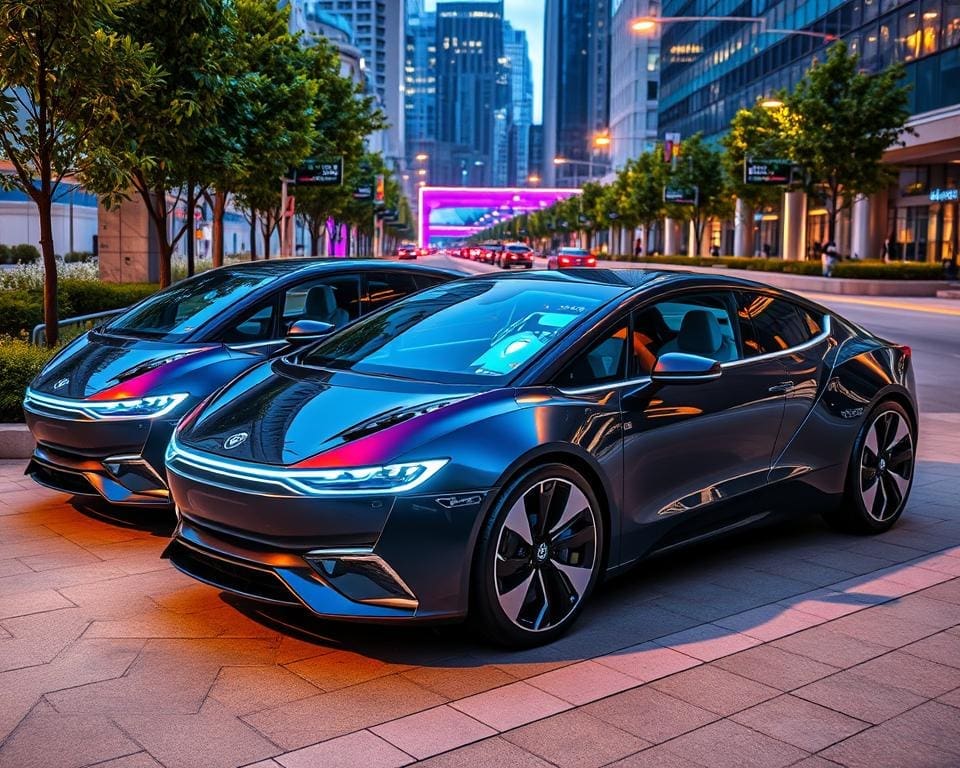The automotive industry is undergoing a remarkable transformation as cars with AI increasingly take centre stage. The integration of artificial intelligence into vehicles, exemplified by prominent manufacturers like Tesla, Mercedes-Benz, and Audi, is revolutionising how we interact with technology while driving. Voice assistants have emerged as an essential feature, allowing for hands-free operations and seamless access to information, enhancing the overall user experience. Smart controls further elevate this experience by providing intuitive interfaces that adapt to driver preferences and needs. As we delve into this innovative realm, it becomes evident that the future of driving is not just about mobility—it’s about connectivity and convenience.
Introduction to Cars with AI
The automotive industry stands on the verge of a revolution, primarily driven by the emergence of smart cars. These vehicles are distinguished from traditional models through their incorporation of AI integration in automobiles, enabling a plethora of enhanced features. As automated technologies advance, the distinction between mere transportation and an interactive driving experience becomes increasingly evident.
AI integration in automobiles has fundamentally altered how we approach vehicle safety, efficiency, and customer experience. For instance, smart cars not only assist drivers but also learn from their habits, adjusting functionalities to fit individual preferences. This adaptability fosters a more intuitive and enjoyable driving atmosphere, drawing on advanced automotive technology to create seamless interactions.
Statistics indicate a significant acceleration of growth within the automotive sector, fuelled by these advancements. Reports suggest that the market for smart cars is set to continue expanding, making way for innovations focused on user satisfaction and energy conservation. In the near future, we can expect to see smart cars equipped with features that provide enhanced driver support and improved safety standards.
The benefits presented by this technological shift are numerous. Increased safety measures, enhanced user experiences, and energy efficiency represent just a few advantages brought forth by the integration of AI within the automotive sphere. The shift towards smart vehicles reflects a broader trend in society towards embracing intelligent solutions, marking an inspiring transition into the future of mobility.

The Evolution of Smart Cars
The journey of smart technology in the automotive industry is a fascinating reflection of innovation and progress. The history of smart cars began long before the term ‘smart’ became synonymous with *vehicles with artificial intelligence*. Early developments in automotive engineering set the stage for what would become a revolution in driving.
One of the pivotal moments in this evolution was the introduction of GPS technology, which transformed navigation and route planning. This technology not only improved driving efficiency but also laid the groundwork for advanced functionalities that we see today in vehicles with artificial intelligence.
As consumer electronics began to influence automotive design, brands like Apple and Android pushed the boundaries of smart technology integration. Their innovations have driven automakers to create *vehicles with artificial intelligence* that offer seamless connectivity and user-friendly interfaces.
The emergence of automated systems marked another leap forward in the history of smart cars. These systems provided a glimpse into the future, showcasing the potential for enhanced safety and convenience in driving. With every advancement, the expectations of drivers evolved, leading to a demand for more intuitive and responsive vehicles.
Today, smart cars embody a convergence of technology and design, offering not only functionality but also an engaging driving experience. The evolution of these *vehicles with artificial intelligence* continues to inspire a new generation of automotive innovations, promising an exciting future for drivers worldwide.
Cars with AI: From Voice Assistants to Smart Controls
In the evolving landscape of automotive technology, voice-controlled vehicles have emerged as a transformative force. These systems enable hands-free operation, promoting safety and accessibility for drivers across various environments. Modern manufacturers like BMW and Ford have adopted advanced voice recognition technologies, enriching the overall driving experience.
The Role of Voice-Controlled Vehicles
Voice-controlled vehicles play a crucial role in modern driving. These systems allow drivers to perform numerous tasks without taking their hands off the wheel or eyes off the road. The integration of intuitive voice commands ensures a seamless connection between the driver and the vehicle, facilitating operations such as:
- Setting navigation routes
- Adjusting climate controls
- Controlling music playback
Such capabilities not only enhance the convenience of vehicle operation but significantly contribute to road safety by reducing distractions.
How Smart Controls Enhance Driving Experience
Smart controls in vehicles go beyond voice activation. Touchscreens and gesture controls create an interactive environment that mirrors personal preferences and priorities. These technologies allow users to personalise settings effortlessly, tailoring the driving experience to individual needs. For instance, intuitive interfaces enable:
- Quick access to essential functions
- Customisable driver profiles
- Enhanced connectivity with mobile devices
Such innovations not only improve user interaction but also empower drivers with a sense of control, making every journey more enjoyable.
AI Integration in Automobiles
As the automotive industry progresses, the AI integration in automobiles becomes increasingly sophisticated. Understanding the technology that drives this integration reveals vast possibilities for innovation. Concepts such as machine learning, big data analytics, and neural networks serve as the backbone for modern vehicle applications, allowing for enhanced functionality and user experience.
Understanding the Technology Behind AI
Machine learning empowers vehicles to adapt and respond to various driving conditions, improving performance and safety. Advanced analytics plays a crucial role in processing the massive amounts of data generated by modern vehicles, enabling manufacturers to evaluate user behaviour and vehicle performance. Neural networks are used to process complex data patterns, allowing systems in cars to communicate more effectively with one another.
Applications of AI in Modern Vehicles
Real-life applications of AI are transforming how we interact with our cars. For instance, Ford and Toyota are utilizing predictive maintenance techniques to anticipate and resolve mechanical issues before they arise. Intelligent navigation systems offer not only route optimisation but also real-time traffic updates to enhance fuel efficiency. Companies like NVIDIA are at the forefront, providing cutting-edge AI chips that revolutionise how vehicles process information, yielding significant improvements in safety and efficiency.
Advanced Automotive Technology
As the automotive industry advances, the forefront of innovation is defined by remarkable advancements in automotive technology. These developments not only enhance the driving experience but also contribute to greater connectivity and safety on the roads. Connected car technology, such as Vehicle-to-Everything (V2X), stands as a prime example of how vehicles can communicate with each other and surrounding infrastructure, facilitating a seamless flow of information that promotes efficiency and safety.
Brands like Tesla, Volkswagen, and Jaguar are leading the charge in integrating advanced automotive technology into their models. These manufacturers are focusing on improving smart driving features, with many vehicles now equipped with sophisticated sensors and AI-driven systems. These elements make it possible for drivers to enjoy a more intuitive and enhanced driving experience.
Electric vehicles (EVs) have particularly benefited from these technological strides. Innovations in battery optimisation and energy management systems allow for longer journeys with superior performance. The synergy between AI and EV technology is shaping a new era for sustainable driving, encouraging a shift towards greener solutions.
As the landscape of transportation continues to evolve, the role of advanced automotive technology becomes increasingly vital. Consumers can expect a future filled with vehicles that not only promise greater autonomy but also ensure a more connected and safety-conscious approach to driving.
Intelligent Driving Systems: A New Era in Safety
As the automotive industry shifts towards advanced technology, intelligent driving systems play a pivotal role in enhancing safety on our roads. These systems incorporate a range of vehicle safety features that not only assist drivers but also significantly reduce the likelihood of accidents. Understanding these features is crucial as we venture into the future of automotive innovation.
Features that Promote Vehicle Safety
Several intelligent driving systems have been developed to bolster vehicle safety, including:
- Adaptive cruise control: This system automatically adjusts the vehicle’s speed to maintain a safe distance from the car in front, reducing the risk of rear-end collisions.
- Lane-keeping assistance: By detecting lane markings, this feature helps prevent unintentional lane departures, guiding drivers back into their lane when necessary.
- Automatic emergency braking: This technology can detect an impending collision and apply the brakes to prevent or mitigate the impact, proving essential in emergency situations.
The Future of Autonomous Driving
The autonomous driving future is rapidly approaching, with companies like Waymo and Uber leading the charge in developing fully self-driving vehicles. These advancements in intelligent driving systems pave the way for a safer driving experience, as they continually learn and adapt from vast amounts of data. Insights from the autonomous vehicle symposium reveal that as technology evolves, safety remains a primary concern. Industry experts predict that widespread adoption of these systems will dramatically decrease accident rates, creating safer roads for everyone.
AI-Enabled Car Features to Look Out For
The automotive world is witnessing a transformation, with exciting advancements in AI-enabled car features that enhance both safety and convenience. This evolution includes state-of-the-art smart navigation systems and innovative driver assistance technologies, paving the way for a smoother driving experience.
Smart Navigation Systems
Smart navigation represents a leap forward in how drivers interact with their vehicles. These systems not only provide real-time traffic updates but also optimise routes based on driving patterns. With brands like Honda leading the charge, drivers can enjoy seamless integration of smart navigation into their everyday journeys. Features such as route recalibration and predictive travel times enhance efficiency, ensuring that every trip is as pleasant as possible.
Driver Assistance Technologies
Driver assistance technologies offer a suite of features designed to make driving safer and more intuitive. For example, systems that assist with parking and offer collision avoidance capabilities redefine what it means to drive with confidence. Hyundai showcases innovative applications of these technologies, which adapt to various driving conditions. By tapping into the potential of AI-enabled car features, drivers can experience a remarkable blend of control and support.
AI-Powered Automotive Solutions for Everyday Drivers
As the automotive landscape continues to evolve, AI-powered automotive solutions are swiftly becoming indispensable for everyday drivers seeking an enhanced driving experience. These technologies, designed with user convenience in mind, integrate personalised connectivity features that allow drivers to stay connected while on the road. Whether it’s real-time traffic updates or customised route suggestions, these innovations ensure that every journey is smooth and tailored to individual needs.
Moreover, the application of AI in vehicle diagnostics simplifies maintenance by providing drivers with timely alerts regarding potential issues. This not only promotes vehicle longevity but also fosters peace of mind among owners. Everyday drivers can now rely on these advanced solutions to help them make informed decisions, resulting in a seamless driving experience that combines safety and efficiency.
Looking ahead, the future of AI in the automotive industry promises to deliver even more groundbreaking innovations. As manufacturers invest heavily in this technology, drivers will benefit from smarter, more intuitive vehicles that not only enhance their daily commutes but also transform the way they interact with their cars. With AI paving the way, the anticipation for next-gen automotive advancements is palpable, inspiring a new era of driving for all.









